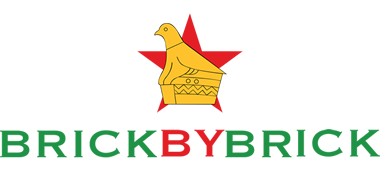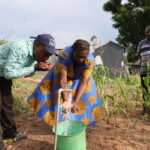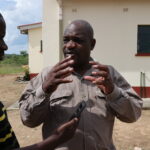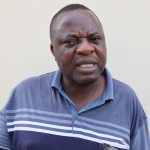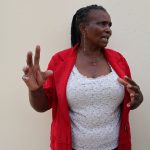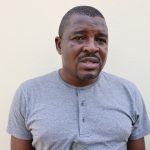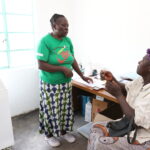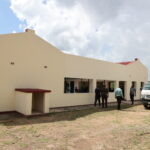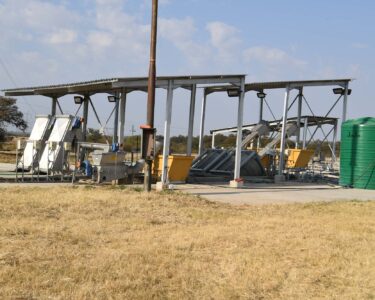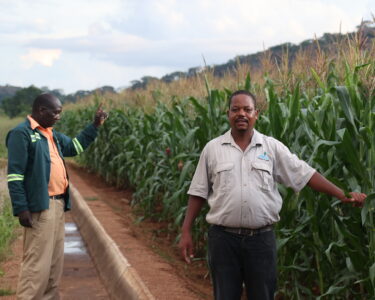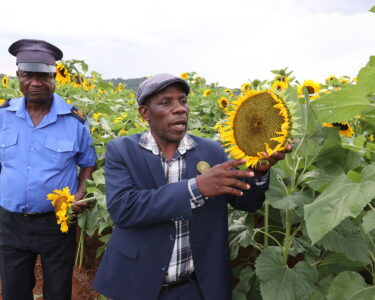Growing up in rural Zimbabwe, it was far-fetched to think, let alone dream, about tap water outside the urban areas. The mere existence of a borehole was something to be cherished – and celebrated – in the same fashion as the winning goal in a soccer World Cup final. And, don’t forget, women and girls had to walk up to 10 km (or more) just to fetch potable water from the nearest river, stream or well.
In the worst case scenario, villagers had to share such water bodies with animals, both domestic and wild. It was that bad; and so villagers in Shiku, located in Runde Rural District in the Midlands Province, have every reason to boast that “devolution has brought town life to Runde”. The majority of the villagers now have tap water at their homesteads, thanks to the Marira Piped Water Project that stretches about 11 km from Mabasa Business Centre to Marira Clinic. As our reporter, Elias Chakanyuka reports, villagers in Runde are fast running out of words to thank the Second Republic for implementing the devolution policy to the letter.
The Runde Rural District Council chief executive officer, Golden Moyo, is a delighted man. And why not? In 2007, the-then governor of the Midlands Province, Cephas Msipa (now late), was the guest of honour at the groundbreaking ceremony, organised by the council, for the construction of Marira Clinic. Due to a plethora of challenges, it would take about 10 years before it reached completion stage.
But the overdue celebrations had to be put on ice because there was no water supply to the clinic. Was this an architectural oversight or was it the result of negligence, or more precisely a case of councillors sleeping on the job?
It started badly, but ended well
With a smile of relief lighting up his face, Moyo described how devolution had rescued the situation: “When this project was first mooted, it was anticipated that water would not be a problem. We were banking on groundwater. We thought we could sink boreholes at the clinic, but none of the four sites drilled yielded results. Clearly, we were in a fix.
“Then we heard about the devolution programme around 2017. We were allocated a substantial amount of money. We saw this as an ideal opportunity to solve the perennial groundwater problems in this area, which is not conducive for the drilling of boreholes.
“However, there was some light at the end of the tunnel in the form of a permanent water body at Mabasa. Why not utilise it, we thought? Around 2019, we started laying pipes from Mabasa to Marira Clinic, a distance of about 11 km. We also made a decision that given the high cost of the project, why not expand its scope to embrace other institutions, notably schools and business centre, and the community at large.
“We targeted Shiku Primary School, Bera Secondary School, Venge Primary School, Venge Business Centre and communities along the pipeline. We constructed take-off points leading to households and the selected institutions to help them draw water from the pipeline. I am happy to report that water is now available here at Marira Rural Health Centre (Marira Clinic) while the surrounding schools and households have also benefited.
“We could not afford to sideline the local community, since they supplied most of the non-skilled labour, in both the construction of the clinic and digging trenches for the water pipes.
“The Marira Piped Water Project is a partnership between Runde Rural District Council and the Zimbabwe National Water Authority (Zinwa). As a local authority we did not have the capacity to manage the water infrastructure. It was, in fact, Zinwa who did the designs, mapping and costing for us.
“We also tapped into their existing facility at Mabasa, whose water pump station was meant for the nearby growth point only. Since were now looking at the bigger picture, we offered to assist Zinwa to upgrade the pump station by installing pumps big enough to supply water not only to the growth point but other parts of the district.
“As for the institutions and households along the pipeline, all they need to do is buy their own materials and we do the rest. Hundreds of households have already benefited. However, we want to see more families benefiting,” said Moyo.
The bigger picture
As for the future, Moyo is optimistic.
“The bigger picture for us is to draw water right to the boundaries of the district in Guruguru Ward. We already have a distribution tank in place. All we need is to boost the water supply so that it cascades to the more outlying areas of the district. We have already identified the next highest point to install booster pumps so that water flows to institutions and villages with the help of gravity. We believe the full impact of this project will only be felt if the water goes right to village level, i.e. to the households. This is what Vision 2030 is all about.
“This project was expected to start and finish in 2019, but we failed to meet our target due to resource constraints. There was a mismatch between our budgetary allocations and subsequent disbursements. If were allocated, say, X amount, we were likely to receive less than 20% of that figure. So we had to roll over the project from 2019 to 2022 when it was finally completed. The Covid-19 pandemic and currency volatility also impacted on the project, but we are happy that the health facility is now up and running. This is what His Excellency, President Mnangagwa, means when he says that the Second Republic is “leaving no one and no place behind”!
The executive officer in charge of technical services at Runde Rural District Council, Liberty Hunyenyiwa, was equally delighted: “When devolution started in earnest in 2019, council was unanimous on the need for a water pipeline to ease our perennial water challenges in Shiku, which falls under Chief Masunda. It is not a secret that Shiku is not only dry, but the water table is also very, very low.
“Since time immemorial, Shiku has faced problems in terms of a reliable permanent water supply. The few boreholes have a tendency of running dry. We were actually on the verge of hiring a bigger rig capable of drilling up to 200 metres down.
“With the advent of devolution in 2019, we found it prudent to harness water from the Mabasa-Zinwa water treatment plant to Marira Clinic at the same time providing all the institutions and households along the way with safe and clean water.”
Devolution in action
Hunyenyiwa said through the Marira Piped Water Project, one can see devolution at work.
“This is a massive project. It supplies water to three primary schools, two secondary schools, two business centres and 12 villages under Headman Shiku.
“The people in this area are thrilled because the water project paved way for the long-awaited opening of Marira Clinic. The clinic was constructed to ease the plight of villagers from the surrounding areas who used to walk long distances to Mabasa and Matenda to seek medical treatment.
“Local schools, Shiku Primary School in particular, suffered from serious water challenges, leading to a staff exodus.
“You can see devolution in action here. President Mnangagwa is indeed fulfilling his promise of leaving no one and no place behind in terms of development. This is a remote rural area, but people here now have tap water in their homes.
“Most people here were going to Runde River to bath and fetch drinking water, often competing with animals. This was a recipe for health disaster as it’s not safe for human beings to drink water straight from the river. Now the villagers have treated water in their villages and they are happy. What else can one ask for?”
Indeed what else can one ask for? Isn’t it they say water is life?
“President Mnangagwa is making us proud”
The Zvishavane district development coordinator, Darlington Chokera, applauded President Mnangagwa for making his job much easier and more enjoyable, thanks to devolution.
“First, I want to thank the devolution policy under the Second Republic. President Mnangagwa vari kudadisa because even people in remote areas are seeing the positive developments being implemented by government through devolution funds. We now enjoy coming to work because the people can see the results of our work.
“Devolution has created a window for us to embark on projects like the Marira Clinic. In the past, this was difficult and, in some instances, even impossible to implement. The Marira Piped Water Scheme is the pride of Runde District.
“We want to thank President Mnangagwa for this life-changing project. He is, indeed, leaving no one and no place behind in terms of development. People here are seeing the Second Republic at work. Some of the places that were neglected in the past are getting the much-needed services. It used to be very rare to find piped water in rural areas, but under President Mnangagwa piped water is now readily available even in the remotest areas.”
‘This clinic is our pride’
The sister-in-charge at Marira Clinic, Theresa Mariba, was over the moon when asked to comment on how the new medical facility had benefited the community.
“The clinic opened its doors to the public on 4 January 2023 and I can tell you that the community is very excited. Can you imagine some villagers are coming to the clinic just to watch me and the nurses at work? Yes, they sit there and observe us do our work.
“For your information, the clinic is being run by a six-member committee comprising members from the community. In terms of our staff complement, we have three nurses, one nurse aide, a general hand and security guard
“This clinic is a real blessing to the community. We have treated babies as young as two months old to senior citizens in their late 80s/90s. Leg and back problems are the major ailments affecting the elderly patients. Some come here complaining of dizziness. In most cases, I am not in a position to help them because I have no BP or diabetes testing machines. Their availability will make our work much easier.
“We are open from 7.00am to 4.00pm. But I am on call 24/7. Thus, if a patient falls sick at night, the guard knocks on my door up since I live on the premises in a house built from devolution funds. However, we need two more houses for nurses and due to the increasing workload, we require two more nurses. This clinic is very, very busy and so sometimes we must forgo our tea and lunch breaks. We have the electricity infrastructure, but we are still waiting for power to be connected to the clinic.
“Despite the challenges, I can say so far so good because we are serving and saving the community. There is no greater satisfaction than that.”
“We can’t thank President Mnangagwa enough”
Of course, our job would not be complete without sounding out the people on the ground. All protocol observed, the Brick by Brick team called on the traditional leadership comprised of Chief Masunda and Headman Shiku to share their views.
Chief Masunda: “I think we are now much better than most people who live in towns and cities because our water taps here never run dry. We have water 24/7. I can’t thank President Mnangagwa enough for coming up with the devolution policy. Growing up, we never imaged that one day we would have tap water right at our doorsteps. Water is life and this means a lot to the people in this area.”
Headman Shiku: “It’s now nyika yaShiku zvino. Shuwa tiri kuona nyika ichivakwa nevene vayo. As headmen, we are now being respected in the community. When we tell our people that the Second Republic is a working government, they now believe us. Our job has been made much easier.”
Mavis Mahuvava, Runde Rural District Council chairperson and sitting councillor for Ward 1: “Ndinonyanyisa kufara nekubuda kwakaita project iyi. I am very happy because there are only six women in the council and we pushed very hard for the success of this project. As women, we understand issues to do with the availability of water much better than our male counterparts. It was not easy to convince men to give priority to this historic water project.
“Our leadership skills as women were clearly evident as we lobbied for the implementation of this project right from the word go. When the first four boreholes yielded nothing, some people were resigned to the fact that the clinic will never open its doors, but we fought tirelessly to ensure that the project was completed.
“When we heard about devolution, we were very excited because we knew that now we could draw water from Runde Dam near Mabasa Business Centre. Takasununguka tikafara. We knew that through this devolution project, many people in the area will be grateful to President Mnangagwa.
“We have a resolution in council to the effect that each and every ward should have one or two clinics. This is meant to protect women and girls because it is them who face challenges relating to the availability of water and health services. To cite an example, some patients were walking up to 20 km to Matenda in search of medical treatment while others walked 15 km to Mabasa Clinic.
“It was worse for pregnant women. Very few households own cars in this part of the country, forcing pregnant women to walk long distances. Vanhu vekuno kwaRunde vari kufara zvisingabviri. Tiri kufara zvakanyanyisa.
“Apart from the clinic and households, the long list of beneficiaries includes Venge Primary School, Shiku Primary School, Wasima Secondary School, Danga primary and secondary schools – five schools in all. Tavakuvhura mvura mupombi kuti pfaaa sekutawindi.
“I want to thank President Mnangagwa for the devolution project. We should give our President another mandate so that he brings industrialisation to the rural areas. Hapana chinokonesa Vision 2030! President Mnangagwa is from the Midlands Province and so we are not only proud, but we also want to make him proud. Tiri kufara zvakanyanya!
Beatrice Mutare, Ward 4 councillor: “Marira Clinic is in Ward 4 and, as the sitting councillor, I can’t contain my excitement. This clinic yakanyanya kundisimudzira because people from my area no longer walk long distances in search of medical treatment. Quite a number of children from this area were born, either in scorch-carts or in cars while their pregnant mothers were on their way to far-off clinics.
“When the idea of this clinic was first mooted, I never thought it would see the light of day. Ndinoda kutenda Mwari nenyasha zhinji. Tinotenda Shumba Murambwi, Chikara, Vanokanga nyama nomuromo. Nyanengwe nhema. Mudzungairi weshambo chena. Ivo vakahwa kuzipa kwemhandara. Shumba zvawonekwa. Vakaita havo Shumba Chikara!”
Abigail Kambunda, Kambunda Village in Venge area: “We had serious water problems in this area. We are happy that we now have this health facility serving us and we have clean water nearby. We used to walk for over 10 km to Mabasa or Matenda for medical attention. We resorted to hiring cars, which did not come cheap. We also used scotchcarts, but these were not of much help in emergency cases. We are happy that this health facility is now up and running.
“We are happy that chero varoora vava kufarira kuuya kumusha because mvura yavapo. We no longer need to go to Harare because Harare has been brought here through devolution.”
Delani Moyo, from Venge: “I am happy that I now have tap water at my house. I want to thank the government for availing the devolution funds that have made this project a roaring success. I am now doing a number of small farming projects at my homestead which I could not do before in the absence of water.
“Getting drinking water was quite a nightmare in this area. I want to thank President Mnangagwa because he really helped us a lot. I know for some people this may appear to be nothing to shout about, but this health facility and the water have completely transformed our lives and livelihoods.”
Johnson Shava from Mbingwa Village in Ward 4: “We used to walk long distances to fetch potable water. Many boreholes in this area are seasonal and are prone to drying up. Now that we have water taps at our homesteads, we have embarked on nutrition gardens as advised by President Mnangagwa. Others are now the proud owners of fish ponds at their homesteads.
“Our wives and daughters used to wake up around 3.00am to fetch water often at great risk to their lives. I am also very happy because my wife is now prepares my meals on time. There are no more excuses like ‘I couldn’t cook in time because I had gone to the river to fetch water.’ I am happy, so is the rest of the community.”
Martha Gumbe from Chirinda Village: “I am personally happy because we now have this health facility here. We used to walk long distances to Mabasa or Matenda to get treatment. Takaitirwa nyasha tikavakirwa chipatara. This clinic is close by and it is serving us very well because water is readily available.
“Our school-going children were used to drinking unsafe water. To keep water-borne diseases at bay we had to force them to carry water bottles to school. We have since stopped, now that clean and safe water is readily available on the school premises. Hatichavapi tuma bottle toziva nokuti mvura yavako kuchikoro.

